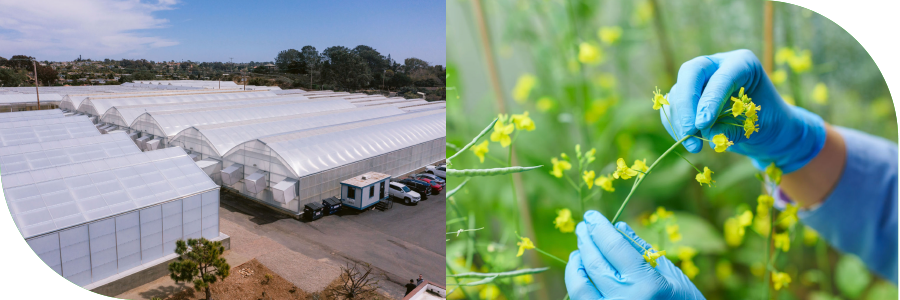Our Story
The major long-term challenge in agriculture is to breed crop traits with enhanced characteristics that can address the multitude of environmental challenges of farming. The critical goal of new breeding technologies is to materially transform the productivity of the current lengthy and random traditional breeding process that averages more than a decade into a timebound, reproducible and predictable science-based breeding process.
Cibus believes that its RTDS® technology platform and its Trait Machine™ process represents the technological breakthrough that achieves this goal. It provides the ability to materially transform the productivity of the decades long breeding processes into a timebound, reproducible and predictable science-based breeding process.

Our Vision
Cibus was founded in 2001, the same year that Europe effectively banned the use of GMO technologies. Because of these global GMO restrictions, GMO markets were limited and, when available, GMO traits were both expensive and time consuming to breed and commercialize. Our vision was the development of a new generation of technologies that addressed the concerns associated with GMO and changed the speed, breadth and scale of trait development achievable using conventional breeding or GMO processes.
Specifically, our vision was to be leaders in the development of gene editing technologies that mimic the process by which genomic change occurs in nature. Because plant traits from these technologies are indistinguishable from traits that occur in nature, we believed that gene edited traits would be regulating as traits developed using traditional breeding. This is the driver of the current global regulatory processes that regulating traits from gene editing like trait developed using conventional breeding processes.
Because of the potential accuracy, speed and range of traits that could be developed using our directed mutagenesis technology, our vision was to build a semi-automated end-to-end gene editing system that would provide a timebound, reproducible and predictable science-based breeding process.
The technology behind our RTDS® technology platform and our Trait Machine™ process is explained in a paper in Plant Biology Journal (2016) by Sauer et al. called: Oligonucleotide-directed mutagenesis for precision gene editing. The technology is now covered by more than 500 patents and patent applications.
2023 is a point of inflection for our vision. We now have a pipeline of six initial traits developed using the Trait Machine process. We have shipped in early 2023, three traits in two different crops (Canola and Rice) to major seed company partners: Nuseed and Nutrien. Further shipments are expected throughout 2023. The other three traits are in advanced stages of development. In addition, in Q1 2023, we entered into a collaboration with Proctor & Gamble (P&G) to develop sustainable low carbon ingredients or materials that do not negatively impact the environment during production, use, or disposal. P&G will fund a multi-year program to develop Sustainable Low Carbon Ingredients that help P&G advance its sustainability objectives.
Importantly, in Q3 2023, we expect to have operational a stand-alone dedicated facility housing the Trait Machine. This will be the industry’s first industrial scale end-to-end semi-automated trait production facility. A stand-alone facility that follows a timebound, reproducible and predictable science-based breeding process.
This has been our vision for over 20 years.

